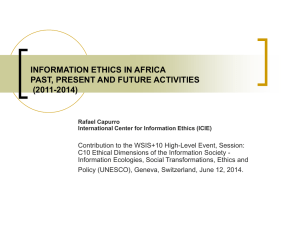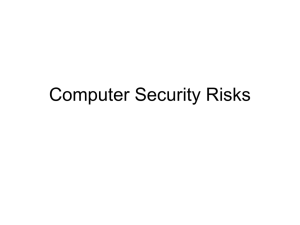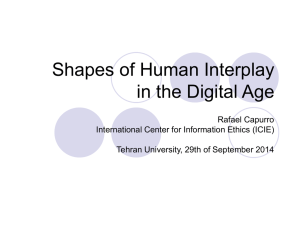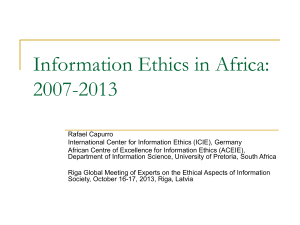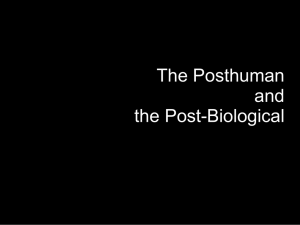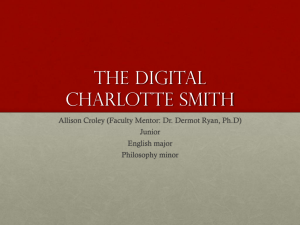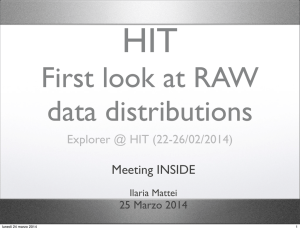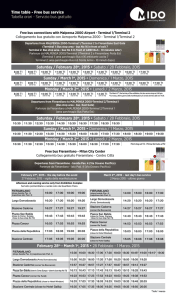Seminario "Teoría de la información"
advertisement
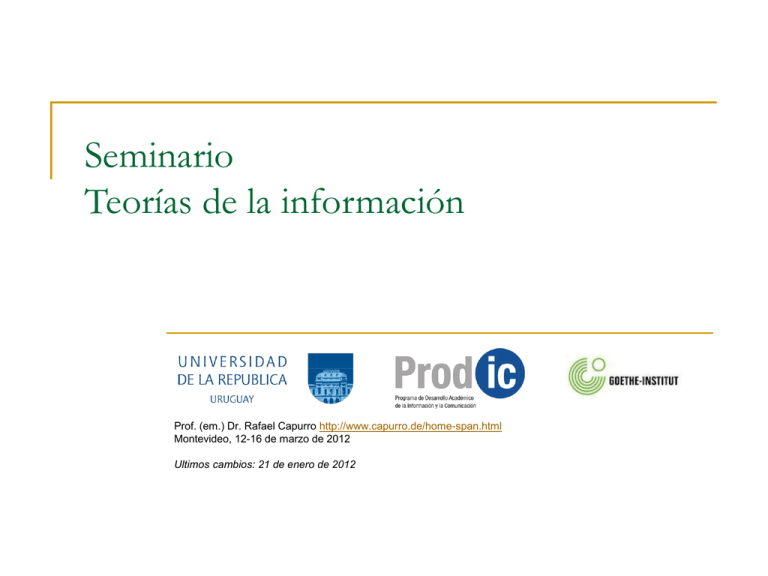
Seminario Teorías de la información Prof. (em.) Dr. Rafael Capurro http://www.capurro.de/home-span.html Montevideo, 12-16 de marzo de 2012 Ultimos cambios: 21 de enero de 2012 Estructura del seminario Fecha: 12 – 16 de marzo de 2012 Lugar: Horas presenciales: de lunes a jueves de 17 a 21hs. Horas de consulta individual: una hora antes o una hora después de las clases. Horas no presenciales: de lunes a viernes de 9 a 12 y de 14 a 16hs. R.Capurro: Teorías de la información 2 Estructura del seminario Contenidos: Lunes 12 de marzo Introducción (1.) Origen y desarrollo de la noción de información (2.) Martes 13 de marzo Teorías actuales de la información (3.) Miércoles 14 de marzo La noción de información en el contexto de las ciencias sociales (4.) Jueves 15 de marzo La noción de información en el contexto de la ciencia de la información (5.) Conclusión R.Capurro: Teorías de la información 3 Estructura del seminario Lunes 12 de marzo, 1. Introducción 2. Origen y desarrollo de la noción de información Lectura obligatoria Pasado, presente y futuro de la noción de información http://www.capurro.de/leon.pdf The Concept of Information (R. Capurro, Birger Hjørland) http://www.capurro.de/infoconcept.html Lectura recomendada Is a Unified Theory of Information feasible? (R. Capurro, Peter Fleissner, Wolfgang Hofkirchner) http://www.capurro.de/trialog.htm R.Capurro: Teorías de la información 4 Estructura del seminario Martes 13 de marzo 3. Teorías actuales de la información Lectura obligatoria Pasado, presente y futuro de la noción de información http://www.capurro.de/leon.pdf The Concept of Information (R. Capurro, Birger Hjørland): http://www.capurro.de/infoconcept.html Lectura recomendada Is a Unified Theory of Information feasible? (R. Capurro, Peter Fleissner, Wolfgang Hofkirchner) http://www.capurro.de/trialog.htm R.Capurro: Teorías de la información 5 Estructura del seminario Miércoles 14 de marzo 4. La noción de información en el contexto de las ciencias sociales Lectura obligtoria Pasado, presente y futuro de la noción de información http://www.capurro.de/leon.pdf The Concept of Information (R. Capurro, Birger Hjørland): http://www.capurro.de/infoconcept.html Información y acción moral en el contexto de las nuevas tecnologías http://www.capurro.de/marilia.html Lectura recomendada La hermenéutica y el fenómeno de la información http://www.capurro.de/herminf.html La hermenéutica frente al desafío de la técnica digital http://www.capurro.de/hermeneutica_porto.html Informations- und Kommunikationsutopien http://www.capurro.de/infoutopien.html R.Capurro: Teorías de la información 6 Estructura del seminario Jueves 15 de marzo 5. La noción de información en el contexto de la ciencia de la información 6. Conclusión Lectura obligatoria The Concept of Information (R. Capurro, Birger Hjørland): http://www.capurro.de/infoconcept.html Epistemología y ciencia de la información http://www.capurro.de/enancib.htm Knowledge Map of Information Science http://www.capurro.de/zins.html What is Information Science for? http://www.capurro.de/tampere91.htm Secreto, lenguaje y memoria en la sociedad de la información (Rafael Capurro, Raquel Capurro) http://www.capurro.de/secreto.html Lectura recomendada Beyond Humanisms http://www.capurro.de/humanism.html Angelética http://glossarium.bitrum.unileon.es/Home/angeletica Mensaje http://glossarium.bitrum.unileon.es/Home/mensaje R.Capurro: Teorías de la información 7 1. Introducción Objetivos del seminario Textos del autor Sitios web Revistas R.Capurro: Teorías de la información 8 1.1 Actualidad del tema La(s) sociedad(es) de la información La revolución digital y la transformación de la „galaxia Gutenberg“ (McLuhan) La transformación de las relaciones sociales, culturales, económicas y políticas La brecha digital Ética de la información Información y ecología R.Capurro: Teorías de la información 9 1.2 Textos del autor Artículos Pasado, presente y futuro de la noción de información http://www.capurro.de/leon.pdf The Concept of Information (R. Capurro, Birger Hjørland) http://www.capurro.de/infoconcept.html Is a Unified Theory of Information feasible? (R. Capurro, Peter Fleissner, Wolfgang Hofkirchner) http://www.capurro.de/trialog.htm Angelética http://glossarium.bitrum.unileon.es/Home/angeletica Mensaje http://glossarium.bitrum.unileon.es/Home/mensaje Secreto, lenguaje y memoria en la sociedad de la información (Rafael Capurro, Raquel Capurro) http://www.capurro.de/secreto.html La hermenéutica y el fenómeno de la información http://www.capurro.de/herminf.html La hermenéutica frente al desafío de la técnica digital http://www.capurro.de/hermeneutica_porto.html Información y acción moral en el contexto de las nuevas tecnologías http://www.capurro.de/marilia.html Informations- und Kommunikationsutopien http://www.capurro.de/infoutopien.html R.Capurro: Teorías de la información 10 1.2 Textos del autor Epistemología y ciencia de la información http://www.capurro.de/enancib.htm Knowledge Map of Information Science http://www.capurro.de/zins.htmml What is Information Science for? http://www.capurro.de/tampere91.htm Hablar de amor http://www.capurro.de/hablar_de_amor.html9 „Das Capurrosche Trilemma“ http://www.capurro.de/janich.htm Libros Information http://www.capurro.de/info.html (1978) Hermeneutik der Fachinformation http://www.capurro.de/hermeu.html (1986) Leben im Informationszeitalter http://www.capurro.de/leben.html (1995) Messages and Messengers. Angeletics as an approach to the phenomenon of communication (2011) (R. Capurro – John Holgate) Beyond Humanisms http://www.capurro.de/humanism.html A dialogue on intercultural angeletics http://www.capurro.de/intercultural_angeletics.html (R. Capurro – Makoto Nakada) Biblioteca digital: http://www.capurro.de/db.htm ICIE: http://icie.zkm.de/publications/books R.Capurro: Teorías de la información 11 1.3 Sitios web Sitio BITrum https://sites.google.com/site/proyectobitrum/Home Glosario BITrum en castellano http://glossarium.bitrum.unileon.es/ind Foundations of Information Science (FIS) http://infoscience-fis.unizar.es/ International Center for Information Ethics (ICIE) http://icie.zkm.de International Center for Information Ethics (ICIE) http://icie.zkm.de Red Latinoamericana de Etica de la Información (RELEI) http://redeticainformacion.ning.com/ Red universitaria de ética en el ciberespacio: http://www.redciberetica.org/ Consultar: http://icie.zkm.de/institutions R.Capurro: Teorías de la información 12 1.4 Revistas Information http://www.mdpi.com/journal/information/ International Review of Information Ethics (IRIE) http://www.i-r-i-e.net Ethics and IT http://www.springer.com/computer/swe/journal/10676 tripleC http://www.triple-c.at/index.php/tripleC Information 2011, Vol. 2, 3 http://www.mdpi.com/2078-2489/2/3/ triple C: Special Issue: What is really information? An interdisciplinary approach. Vol. 7, No. 2, 2009 http://triple-c.at/index.php/tripleC/issue/view/18 Journal of Information, Communication and Ethics in Society (ICES) http://www.deepdyve.com/browse/journals/journal-of-information-communication-andethics-in-society Library Trends, 2004, 53 (3), 373-670: The Philosophy of Information (Ken Herold, Issue Editor) Introduction: https://www.ideals.illinois.edu/bitstream/handle/2142/1632/Introduction.pdf?sequence=2 Consultar: http://icie.zkm.de/publications/journals/ R.Capurro: Teorías de la información 13 4. La noción de información en las ciencias humanas Fuente: http://glossarium.bitrum.unileon.es/Home/hermeneutica „El debate se concentra particularmente en el síndrome reduccionista es decir el temor a reducir al ser humano a un mero organismo o máquina procesadora de información perdiendo de vista los complejos componentes culturales que caracterizan al conocimiento y, mas exactamene, al observador humano. Si, como dijo Gregory Bateson (1904-1980), http://es.wikipedia.org/wiki/Gregory_Bateson información es “una diferencia que hace una diferencia” la pregunta es entonces cual es la diferencia que “hace” un observador humano.“ (PPF) R.Capurro: Teorías de la información 14 4.1 Hermenéutica digital „Mientras la hermenéutica filólogica estaba ocupada en comprender la verdad de un texto en base a criterios que aseguraran la objetividad de su interpretación, la hermenéutica filosófica descubre que siendo la comprensión una dimensión ontológica del intérprete, R.Capurro: Teorías de la información 15 4.1 Hermenéutica digital este no puede menos que incluírse en dicho proceso lo cual puede entenderse superficialmente como una visión subjetivista y relativista del conocimiento siendo así que se trata de un proceso de autoobjetivación y construcción social e histórica del sujeto así como también, paradójicamente, de una desubjetivización fundamental del mismo. R.Capurro: Teorías de la información 16 4.1 Hermenéutica digital La hermenéutica digital radicaliza este proceso de autocomprensión y autoconstrucción incluyendo los procesos biológicos que vienen siendo entendidos como procesos de comunicación de mensajes que pueden ser modificados artificialmente. R.Capurro: Teorías de la información 17 4.2 Teoría crítica de la información: Christian Fuchs Christian Fuchs http://fuchs.uti.at/ Universidad de Uppsala (Suecia): http://www.im.uu.se/?languageId=1 R.Capurro: Teorías de la información 18 4.2 Teoría crítica de la información: Christian Fuchs Fuente: http://glossarium.bitrum.unileon.es/Home/teoria-critica-de-lainformacion „Christian Fuchs (2008a, b, 2009) ha argumentado que los estudios críticos sobre información debieran ser concebidos dentro del marco de la teoría marxista (es decir, la crítica de la economía política, compárese también el planteamiento “Ciber-Marx” de Nick DyerWitheford 1999) y una noción amplia de una teoría crítica de los medios, la información, la comunicación, la tecnología y la cultura. R.Capurro: Teorías de la información 19 4.2 Teoría crítica de la información: Christian Fuchs La tarea es analizar la dominación y el capitalismo como el contexto de la información y los medios en la sociedad actual, y dar impulso intelectual a la búsqueda de modos alternativos de información y medios que trabajen fuera del capitalismo y la dominación. Fuchs sugiere que este planteamiento permite construir una teoría crítica de internet/TICs y sociedad (Fuchs 2008a, 2009) y una teoría crítica de la información (2009a).“ R.Capurro: Teorías de la información 20 4.2 Teoría crítica de la información: Geert Lovink Geert Lovink Institute of Network Cultures The Institute of Network Cultures is a media research centre that actively contributes to the field of network cultures through research, events, publications and online dialogue. The INC was founded in 2004 by media theorist Geert Lovink, following his appointment as professor within the Institute of Interactive Media at the Amsterdam University of Applied Sciences (Hogeschool van Amsterdam). http://en.wikipedia.org/wiki/Geert_Lovink R.Capurro: Teorías de la información 21 4.2 Teoría crítica de la información: Geert Lovink Critical Point of View. A Wikipedia Reader. http://networkcultures.org/wpmu/cpov/ http://www.networkcultures.org/_uploads/%237reader_Wikipedia.pdf R.Capurro: Teorías de la información 22 4.2 Teoría crítica de la información: José María Díaz Nafría José María Díaz Nafría: Critical Theory of Information, Communication, Media, Technology https://sites.google.com/site/glosariobitrum/Home/teoria-critica-de-la-informacion/critical-theory-of-information R.Capurro: Teorías de la información 23 4.2 Teoría crítica de la información: José María Díaz Nafría „A critical theory of media and technology is based on dialectical reasoning. This allows to see the causal relationship of media/technology and society as multidimensional and complex: A specific media/technology has multiple, at least two, potential effects on society and social systems that can co-exist or stand in contradiction to each other.“ R.Capurro: Teorías de la información 24 4.2 Teoría crítica de la información: José María Díaz Nafría „Which potentials are realized is based on how society, interests, power structures, and struggles shape the design and usage of technology in multiple ways that are also potentially contradictory.“ R.Capurro: Teorías de la información 25 4.2 Teoría crítica de la información: José María Díaz Nafría R.Capurro: Teorías de la información 26 4.3 Fenomenología de las TIC Lucas Introna http://www.lums.lancs.ac.uk/owt/profiles/lucas-introna/ http://en.wikipedia.org/wiki/Lucas_Introna http://plato.stanford.edu/entries/ethics-it-phenomenology/ R.Capurro: Teorías de la información 27 4.3 Fenomenología des TIC http://www.lums.lancs.ac.uk/masters/itmoc/content/ito1/ „This course aims to provide students with a critical understanding of the interrelationships between information, technology, and organisations. Its objectives are twofold: first, to develop students’ awareness of both the historical roots of modern organisations as well as contemporary issues surrounding technology in the knowledge economy; and second, to enable them to critically assess ongoing developments in information, technology & organisation. R.Capurro: Teorías de la información 28 4.3 Fenomenología de las TIC It will consider theories of technology, organisation, and information and seek to convey their mutually constitutive role in organisational life. The course will present, explain and illustrate the key concepts that are relevant to mainstream and critical analysis of the role of technology in contemporary organization - such as technological determinism, the social shaping of technology and actor-network theory. Particular attention will also be paid to issues of information and decision making, work, management control, surveillance and power, conflict and resistance.“ R.Capurro: Teorías de la información 29 4.3 Fenomenología de las TIC Artifact / tool Approach View of technology / society relationship Technologies are tools that society draws upon to do certain things it would not otherwise be able to do. When tools become incorporated in practices it tends to have a more or less determinable impact on those practices. Approach to ethical implications of technologyThe task of ethics is to analyze the impact of technology on practices by applying existing or new moral theories to construct guidelines or policies that will ‘correct’ the injustices or infringements of rights caused by the implementation and use of the particular technology. R.Capurro: Teorías de la información 30 4.3 Fenomenología de las TIC Social Constructivist Approach View of technology / society relationship Technology and society co-construct each other from the start. There is an ongoing interplay between the social practices and the technological artifacts (both in its design and in its use). This ongoing interplay means that technological artifacts and human practices become embedded in a multiplicity of ways that are mostly not determinable in any significant way. Approach to ethical implications of technologyThe task of ethics if to be actively involved in disclosing the assumptions, values and interests being ‘built into’ the design, implementation and use of the technology. The task of ethics is not to prescribe policies or corrective action as such but to continue to open the ‘black box’ for scrutiny and ethical consideration and deliberation. R.Capurro: Teorías de la información 31 4.3 Fenomenología de las TIC Phenomenological ApproachV View of technology / society relationship Technology and society co-constitute each other from the start. They are each other's condition of possibility to be. Technology is not the artifact alone it is also the technological attitude or disposition that made the artifact appear as meaningful and necessary in the first instance. However, once in existence artifacts and the disposition that made them meaningful also discloses the world beyond the mere presence of the artifacts. Approach to ethical implications of technologyThe task of ethics is ontological disclosure. To open up and reveal the conditions of possibility that make particular technologies show up as meaningful and necessary (and others not). It seeks to interrogate these constitutive conditions (beliefs, assumptions, attitudes, moods, practices, discourses, etc.) so as to problematize and question the fundamental constitutive sources of our ongoing being-with technology. R.Capurro: Teorías de la información 32 4.4 Crítica al posthumanismo informacional: Katherine Hayles N. Katherine Hayles: How we became posthuman. Virtual Bodies in Cybernetics, Literature, and Informatics. The University of Chicago Press 1999 http://en.wikipedia.org/wiki/N._Katherine_Hayles Ver mi texto: Beyond Humanisms http://www.capurro.de/humanism.html R.Capurro: Teorías de la información 33 4.4 Crítica al posthumanismo informacional: Katherine Hayles „The emergence of the posthuman as an informational-material entity is paralleled and reinforced by a corresponding reinterpretation of the deep structures of the physical world. (…) In this view, a universal informational code underlies the structure of matter, energy, spacetime–indeed, of everything that exists.“ (Hayles, p. 11) R.Capurro: Teorías de la información 34 4.4 Crítica al posthumanismo informacional: Katherine Hayles „What happens to the embodied lifeworld of humans in this paradigm? In itself, the cellular automata model is not necessarily incompatible with recognizing that humans are embodied beings, for embodiement can flow from cellular automata as easily as from atoms. (…) Central to this argument is a conceptualization that sees information and materiality as distinct entities. (…) It is this materiality/information separation that I want to contest.“ (Hayles, p. 12) R.Capurro: Teorías de la información 35 4.4 Crítica al posthumanismo: Katherine Hayles „What do these developments mean for the posthuman? When the self is envisioned as grounded in presence, identified with originary guarantees and teleological trajectories, associated with solid foundational and logical coherence, the posthuman is likely to be seen as antihuman because it envisions the conscious mind as a small subsystem running ist programm of R.Capurro: Teorías de la información 36 4.4 Crítica al posthumanismo: Katherine Hayles self-construction and self-assurance while remaining ignorant of the actual dynamics of complex systems. But the posthuman does not really mean the end of humanity. It signals instead end of a certain conception of the human, a conception that may have applied, at best, to that fraction of humanity who had the wealth, power, and leisure to conceptulaize themselves as autonomous R.Capurro: Teorías de la información 37 4.4 Crítica al posthumanismo: Katherine Hayles beings exercising their will through individual agency and choice. What is lethal is not the posthuman as such but the grafting of the posthuman onto a liberal humanist view of the self. When Moravec imagines „you“ choosing to download yourself into a computer, thereby obtaining through technological mastery the ultimate privilege of immortality, he is not abandoning the autonomous liberal subject but is expanding R.Capurro: Teorías de la información 38 4.4 Crítica al posthumanismo: Katherine Hayles Ist prerogatives into the realm of the posthuman. Yet the posthuman need not to be recuparated back into liberal humanism, nor need it be construed as antihuman. Located within the dialectic of pattern/randomness and grounded in embodied actuality rather that disembodied information, the posthuman offers ressources for rethinking the articulation of humans with intelligent machines.“ (Hayles, p. 286-287) R.Capurro: Teorías de la información 39 4.4 Crítica al posthumanismo: Katherine Hayles „If the three stories told here – how information lost its body, how the cybor was constructed in the postwar years as a technological artifact and cultural icon, and how the human became the posthuman – have at times seem to present the posthuman as a transformation to be feared and abhorred rather than welcomed and embraced, that reacction has everything to do with how the posthuman is constructed and understood. […] R.Capurro: Teorías de la información 40 4.4 Crítica al posthumanismo: Katherine Hayles Although some current versions of the posthuman point toward the antihuman and the apocalyptic, we can craft others that will be conducive to the long-range survival of humans and of the other life-forms, biological and artificial, with whom we sahre the planet and ourselves.“ (Hayles, p. 291) R.Capurro: Teorías de la información 41 4.5 Privado en público: Helen Nissenbaum Helen Nissenbaum: Privacy in Context. Technology, Policy, and the Integrity of Social Life. Stanford University Press 2010. http://www.nyu.edu/projects/nissenbaum/ R.Capurro: Teorías de la información 42 4.5 Privado en público: Helen Nissenbaum „Privacy in Public. Theories that restrict the right to privacy to the domain of the private may potentially avoid the challenge of conflicting values. […] The dichotomy theories are spared having to explain why video surveillance of public spaces or trawling public records for purposes of aggregation is problematik because, according to them, they are not in the private sphere and therefore are not a privacy problem.“ (Nissenbaum, p. 113) R.Capurro: Teorías de la información 43 4.5 Privado en público: Helen Nissenbaum „Context-Relative Informational Norms and Contextual Integrity. Given the myriad norms that govern activities and practices within and across contexts, consider those that are specifically concerned with the flow of personal information– transmission, communication, transfer, distribution and dissemination–from one party to another, and others. R.Capurro: Teorías de la información 44 4.5 Privado en público: Helen Nissenbaum I will call these informational norms when speaking of them within individual contexts and context-relative informational norms when referring tothem generally. Contextual integrity is defined in terms of informational norms: it is preserved when informational norms are respected and violated when informational norms are breached. R.Capurro: Teorías de la información 45 4.5 Privado en público: Helen Nissenbaum The framework of contextual integrity maintains that the indignation, protest, discomfit, and resistance to technology-based information systems and practices, as discussed in Part I, invariably can be traced to breaches of context-relative informational norms. Accordingly, contextual integrity is proposed as a benchmark for privacy.“ (Nissenbaum, p. 140) R.Capurro: Teorías de la información 46 4.5 Privado en público: Helen Nissenbaum „We have a right to privacy, but it is neither a right to control personal information nor a right to have access to this information restricted. Instead, it is a right to live in a world in which our expectations about the flow of personal information are, for the most part, met; expectations that are shaped not only by force of habit and convention but a general confidence in the mutual support R.Capurro: Teorías de la información 47 4.5 Privado en público: Helen Nissenbaum these flows accord to key organizing principles of social life, including moral and political ones. This is the right I have called contextual integrity, achieved through the harmonious balance of social rules, or norms, with both local and general values, ends, and purposes. This is never a static harmony, however, because over time, conditions change and contexts and norms evolve along with them.“ (Nissenbaum, p. 231) R.Capurro: Teorías de la información 48 4.5 Privado en público: Helen Nissenbaum „These distinctive systems of what I have called context-relative informational norms, governing flows of personal information, are finely tuned to the internal purposes of contexts and also to some degree responsive to fundamental human rights and values. In general, informational norms prescribe the principles under which personal information of certain kinds flow from one point, a sender acting in a certain capacity, to another, a recipient acting in a certain capacity.“ (Nissenbaum, p. 232.) R.Capurro: Teorías de la información 49
